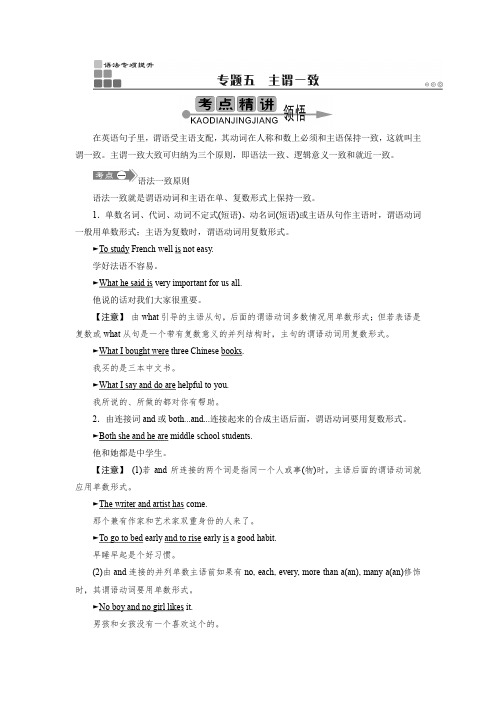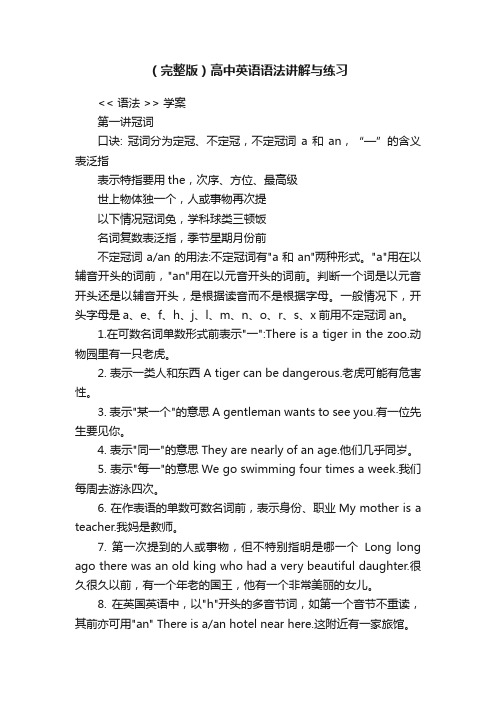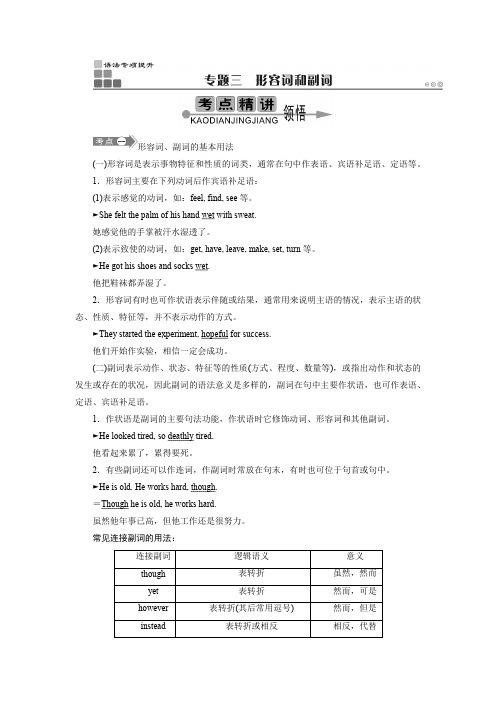高考英语高频语法讲练
- 格式:ppt
- 大小:142.00 KB
- 文档页数:22

在英语句子里,谓语受主语支配,其动词在人称和数上必须和主语保持一致,这就叫主谓一致。
主谓一致大致可归纳为三个原则,即语法一致、逻辑意义一致和就近一致。
语法一致原则语法一致就是谓语动词和主语在单、复数形式上保持一致。
1.单数名词、代词、动词不定式(短语)、动名词(短语)或主语从句作主语时,谓语动词一般用单数形式;主语为复数时,谓语动词用复数形式。
►To study French well is not easy.学好法语不容易。
►What he said is very important for us all.他说的话对我们大家很重要。
【注意】由what引导的主语从句,后面的谓语动词多数情况用单数形式;但若表语是复数或what从句是一个带有复数意义的并列结构时,主句的谓语动词用复数形式。
►What I bought were three Chinese books.我买的是三本中文书。
►What I say and do are helpful to you.我所说的、所做的都对你有帮助。
2.由连接词and或both...and...连接起来的合成主语后面,谓语动词要用复数形式。
►Both she and he are middle school students.他和她都是中学生。
【注意】(1)若and所连接的两个词是指同一个人或事(物)时,主语后面的谓语动词就应用单数形式。
►The writer and artist has come.那个兼有作家和艺术家双重身份的人来了。
►To go to bed early and to rise early is a good habit.早睡早起是个好习惯。
(2)由and连接的并列单数主语前如果有no, each, every, more than a(an), many a(an)修饰时,其谓语动词要用单数形式。
►No boy and no girl likes it.男孩和女孩没有一个喜欢这个的。

高考英语考前玩转高频语法系列-状语从句状语从句是副词性从句,它在句子中担任状语,修饰主句的动词、形容词或副词。
依照修饰的方面,状语从句能够分为以下九种。
1、时间状语从句2、地点状语从句3、缘故状语从句4、目的状语从句5、结果状语从句6、条件状语从句7、方式状语从句8、让步状语从句9、比较状语从句1、时间状语从句【专项训练】:Ⅰ、选择填空:1、YoulikesportsI’dliketoread.A、whenB、whileC、butD、yet2、weweresinging,theteachercamein.A、BeforeB、afterC、AsD、Until3、Iwasabouttoleavemyhousethephonerang.A、whileB、whenC、asD、after4、Theydidnotstopfightingtherewasnoenemyleft.A、untilB、afterC、whenD、since5、Ihavenotseenhimhewenttocollege.A、whenB、beforeC、asD、since6、Itisfivedayswecamehere.A、whenB、beforeC、asD、since7、Itwasnotlonghegottoknowit.A、whenB、beforeC、afterD、until8、Weshallgowearefree.A、wheneverB、whateverC、whereverD、however9、IliveImustservethepeopleheartandsoul.A、WhenB、SolongasC、AssoonasD、Oncondition10、IwasreadinganovelhewaswatchingTV.A、whenB、whileC、beforeD、as11、Putthemedicineyoucaneasilygetit.A、sothatB、whereC、whichD、there12、WewillgothePartywantsustogo.A、whereverB、thereC、totheplaceD、which13、thereisawillthereisaway.A、WhenB、WhereC、WhetherD、How14、Iamgoingyouwentlastweek.A、whereB、whereverC、whenD、theplace15、yougo,youshouldbearthemotherlandinyourmind.A、WhereB、WhereverC、WhateverD、However16、weatherpermits,we’llhaveanouting.A、ForB、ThoughC、WhileD、If17、Youwon’tsucceedharder.A、unlessyouwillworkB、unlessyouworkC、unlessyoudon’tworkD、ifyouwon’twork18、Iwonderifheus,andIthinkifheuswe’llbeabletocompletethetaskaheadoftime.A、helps,helpsB、willhelp,helpsC、helps,willhelpD、willhelp,willhelp19、Idon’tliketobeinterruptedifI.A、speakB、willspeakC、amspeakingD、spoke20、Ifyouthisexperimentyouwillunderstandthetheorybetter.A、willbedoingB、havedoneC、willhavedoneD、woulddo21、IwouldliketodoitIlikeit.A、sinceB、becauseC、becauseofD、nowthat22、everybodyishere,Let’ssetoff.A、SinceB、BecauseC、ForD、After23、Itwashewasillthathewasabsentyesterday.A、becauseB、asC、sinceD、nowthat24、itisraining,wehadbettertakeataxi.A、ForB、AsC、BecauseofD、When25、“Whycan’tyoudoitnow?”“I’mtoobusy.”A、SinceB、AsC、BecauseD、For26、Hemusthavepassedthisway,herearehisfootprints.A、sinceB、becauseofC、nowthatD、for27、everybodyishere,Let’sbeginourmeeting.A、NowthatB、BecauseC、ForD、When28、Hisspeechmadedeepimpressionontheaudiencethattheycouldhardlyforgetit.A、suchaB、soaC、soD、such29、Theyworkedhardtheyfinishedtheirworkaheadoftime.A、soB、sothatC、suchthatD、soasto30、Hewasweakhecouldn’tstandup.A、such,thatB、so,thatC、very,thatD、so,asto31、Theforeignerspokehisinterpretercouldhardlycatchhiswords.A、suchfastthatB、sofastC、sofastthatD、sofastlythat32、Thebookisitgivesawrongideaofthefacts.A、sowritingthatB、suchwrittenthatC、suchwritingthatD、sowrittenthat33、Thehousecostwedidn’tbuyit.A、somuchmoneythatB、somanymoneythatC、suchmuchmoneythatD、suchmanymoneythat34、Itisallofuscandoit.A、soeasyexercisethatB、sucheasyanexerciseC、sucheasyexerciseD、soeasyanexercisethat35、Shehassheremembersallthenamesofthestudentsshehastaught.A、sogoodmemorythatB、suchagoodmemorythatC、suchgoodmemorythatD、goodmemory36、TheystoppedatTianjingtheymightvisittheTVtower.A、soB、becauseC、sothatD、inorder37、Weallgotupearlywemightstartatsix.A、inorderthatB、inordertoC、soD、soasto38、Letthedogloosesothatithavearun.A、shouldB、mustC、couldD、need39、clearlysothatyourteacheryoucorrectly.A、Write,canunderstandB、Havingwritten,canunderstandC、Towrite,couldunderstandD、Writing,willunderstand40、Hestartedearlysothathethereintime.A、couldgetB、gotC、hadgotD、wouldhavegot41、itwaslate,shewentonworking.A、ThoughB、BecauseC、SinceD、Whether42、wefail,wetrying.A、Evenif,don’tstopB、Eventhough,won’tstopC、Even,willnotstopD、Evenalthough,shallneverstop43、thepainwasbad,hedidnotcomplain.A、Although,butB、Though,butC、Though,yetD、Even,still44、physics,helikesmathsbetter.A、AshemuchlikesB、MuchashelikesC、MuchlikesasheD、Likesmuchashe45、telephones,tellhimI’mout.A、NomatterwhoeverB、WhoC、WhoeverD、Anyone46、We’llcarrythereformtotheendhappens.A、nomatterhowB、whateverC、anythingD、nomatterwhich47、Ittakestimetogotherebyplanethanbyship.A、farfewerB、farlessC、muchfewerD、moreless48、Heistallerthaninhisclass.A、othersB、allthestudentsC、anyotheroneD、theother49、itwasfinishedintime.A、AstheworkwasdifficultB、DifficultastheworkwasC、DifficultaswastheworkD、Aswastheworkdifficult50、IamsorryIhavecausedsomuchtrouble.A、thatB、forC、asD、since51、hecame,hewouldbringusalotofflowers.A、EverytimesB、onetimeC、EverytimeD、Onceatime52、I’lltellhimaboutitIseehim.A、assoonasB、sosoonasC、whileD、as53、IhadhardlysatdownthetelephonerangA、thanB、whenC、asD、after54、Sityoulike.A、whereB、attheplaceC、asD、wherever55、hewasn’treadyintime,wewentwithouthim.A、SinceB、AsC、ForD、Becauseof56、Allplantsneedairtheyneedwater.A、likeB、asifC、asD、so57、Workhardyoucansucceed.A、inordertoB、sothatC、forfearthatD、incase58、IfyouIwillgowithyou.A、gotoB、wentC、willD、shouldgo59、Thehardheworks,hewillmake.A、thegreaterB、thegreaterprogressC、andthemoreD、more60、wehavethoughtitover,we’lltakesteps.A、Till,notB、When,noC、Until,anyD、Until,noⅡ、改错1、Itwon’tmatterevenherefuses.2、Jimimaginedthatthewholeworldknewofhisachievements,wheninfactonlyafewpeoplehadheardofit.3、Herealizedthathishousemusthavebeenbrokenintotheminutehegothomeandsawthateverythingwasinamess.4、Hewaslookingforthedictionarywheneverhethoughthemighthaveputit.5、Nomatterifheisfree,hemustgotothelibrary.6、IhavenotmissedaplayoraconcertwhenIwasseventeenyearsold.7、NexttimethatIplantotravelinLondon,I’mgoingtotakeaplane.8、I’mnotgoingtotalkonthepointanyfurther,thoughitisneitherimportantnorveryinteresting.9、MuchsinceIlikeallthebooks,Ican’taffordtobuythem.10、Alicwaswaitingforthebusthenshenoticedathiefrunningoutofashop.11、Ithasbeentwoandahalfmonthsagosinceheleft.12、Thoughtheworkwasdifficult,butwemanagedtofinishitintime.13、ThetestshowsthatJackhasamuchquickermindthananystudentinhisclass.14、HeleftforGuangzhoubytrainlastMonday.Heoughttohavearrived,Ithink..15、Theywrotetothebossinordertheycouldimprovetheirworkingconditions.16、Hegoesfishingwhereverhehastime,whichisnotoften.17、Idon’tknowwhenhecomestomorrow.Ifhecomes,letmeknowatonce.18、Whenyoureadabook,you’dbettermakeamarkthatyouhaveanyquestions.19、Shipsaremuchmoreslowerthanplanesthatfewpeopletakethemonbusiness.20、Shehassuchlittleeducationthatsheisunfitforthejob.【答案】:Ⅰ、1、 B 2、C 3、B 4、A 5、D 6、D7、B 8、A 9、B 10、B 11、B 12、A13、B 14、A 15、B 16、D 17、B 18、B19、C 20、B 21、B 22、A 23、A 24、B 25、C26、D 27、A 28、A 29、B 30、B 31、C 32、D33、A 34、D 35、B 36、C 37、A 38、C 39、A40、A 41、A 42、B 43、C 44、B 45、C 46、B47、B 48、C 49、B 50、A 51、C 52、A 53、B54、D 55、B 56、C 57、B 58、C 59、B 60、D Ⅱ、1、even后加if2、when—while3、minute—moment4、whenever—wherever5、if—whether6、when—since7、that去掉或改为when 8、though—because 9、since—as10、then—when 11、ago去掉12、but去掉13、any后加other 14、 15、order后加that16、wherever—whenever17、第一个comes—willcome〔宾从时态不限〕18、that—where19、more去掉20、such—so。

(完整版)高中英语语法讲解与练习<< 语法 >> 学案第一讲冠词口诀: 冠词分为定冠、不定冠,不定冠词a和an,“—”的含义表泛指表示特指要用the,次序、方位、最高级世上物体独一个,人或事物再次提以下情况冠词免,学科球类三顿饭名词复数表泛指,季节星期月份前不定冠词a/an的用法:不定冠词有"a和an"两种形式。
"a"用在以辅音开头的词前,"an"用在以元音开头的词前。
判断一个词是以元音开头还是以辅音开头,是根据读音而不是根据字母。
一般情况下,开头字母是a、e、f、h、j、l、m、n、o、r、s、x前用不定冠词an。
1.在可数名词单数形式前表示"一":There is a tiger in the zoo.动物园里有一只老虎。
2. 表示一类人和东西 A tiger can be dangerous.老虎可能有危害性。
3. 表示"某一个"的意思A gentleman wants to see you.有一位先生要见你。
4. 表示"同一"的意思They are nearly of an age.他们几乎同岁。
5. 表示"每一"的意思We go swimming four times a week.我们每周去游泳四次。
6. 在作表语的单数可数名词前,表示身份、职业My mother is a teacher.我妈是教师。
7. 第一次提到的人或事物,但不特别指明是哪一个Long long ago there was an old king who had a very beautiful daughter.很久很久以前,有一个年老的国王,他有一个非常美丽的女儿。
8. 在英国英语中,以"h"开头的多音节词,如第一个音节不重读,其前亦可用"an" There is a/an hotel near here.这附近有一家旅馆。

入舵市安恙阳光实验学校十一、交际用语1.—Could I use your computer for a few moments,please?—________.I'm not using it myself.A.Come on B.It dependsC.Go ahead D.That's great答案 C [go ahead表示“请用吧,请便”。
]2.—I am afraid the task is too difficult for me.sir.—________,Linda.Just believe in yourself!A.No problem B.That's all rightC.That's OK D.Come on答案 D [考查情景交际。
句意:“先生,恐怕这个任务对我来说太艰巨了。
”“加油,琳达。
相信自己。
”根据语境应表示对对方的鼓励,故用Come on。
]3.—How do you find the concert in the Beijing Grand Theatre last night?—________.But the conductor was perfect.A.I couldn't agree moreB.I don't think much of itC.I was crazy about itD.I really like it答案 B [考查交际用语。
句意:“你觉得昨晚北京大剧院的音乐会怎么样?”“我觉得不怎么样,但是那位指挥很棒。
”think much of “高度评价”。
]4.—Do you have Mary's phone number?—Sorry,________.A.I don't know B.forget itC.here you are D.I can't remember it答案 D [句意:“你有玛丽的电话号码吗?”“很抱歉,我不记得了。

形容词、副词的基本用法(一)形容词是表示事物特征和性质的词类,通常在句中作表语、宾语补足语、定语等。
1.形容词主要在下列动词后作宾语补足语:(1)表示感觉的动词,如:feel, find, see等。
►She felt the palm of his hand wet with sweat.她感觉他的手掌被汗水湿透了。
(2)表示致使的动词,如:get, have, leave, make, set, turn等。
►He got his shoes and socks wet.他把鞋袜都弄湿了。
2.形容词有时也可作状语表示伴随或结果,通常用来说明主语的情况,表示主语的状态、性质、特征等,并不表示动作的方式。
►They started the experiment, hopeful for success.他们开始作实验,相信一定会成功。
(二)副词表示动作、状态、特征等的性质(方式、程度、数量等),或指出动作和状态的发生或存在的状况,因此副词的语法意义是多样的,副词在句中主要作状语,也可作表语、定语、宾语补足语。
1.作状语是副词的主要句法功能,作状语时它修饰动词、形容词和其他副词。
►He looked tired, so deathly tired.他看起来累了,累得要死。
2.有些副词还可以作连词,作副词时常放在句末,有时也可位于句首或句中。
►He is old. He works hard, though.=Though he is old, he works hard.虽然他年事已高,但他工作还是很努力。
常见连接副词的用法:3.等。
►Fortunately, he was not drowned and was saved by the PLA.幸运的是,他没被淹死,被解放军救了。
形容词、副词表示倍数的句型1.A is (v.)+倍数+比较级+than+B2.A is (v.)+倍数+as+原级+as+B3.A is (v.)+倍数+the+名词(size, length, height 等)+of+B4.A is (v.)+倍数+that+of+B5.A is (v.)+倍数+as many/much+名词+as+B6.A is (v.)+倍数+what 引导的名词性从句►This building is two times higher than that one.=This building is three times as high as that one.=This building is three times the height of that one.这个建筑物是那个建筑物的3倍高。

定语从句与高考定语从句是高考的热点,主要考查关系代词和关系副词的正确运用,特别是它们在非限制性定语从句中的运用。
主要考点有:1.关系代词who, which, that, whom, as, whose的基本用法。
2.关系副词when, where, why的基本用法。
3.定语从句中关系词的特殊用法。
4.定语从句中“介词+关系代词”介词的确定。
5. which/ as引导的非限制性定语从句的区别。
一、定语从句的分类限制性定语从句定语从句非限制性定语从句二、限制性定语从句和非限制性定语从句的区别区别一:形式不同限定性定语从句主句和从句之间不用逗号隔开;而非限定性定语从句与主句之间通常____用___逗号隔开。
区别二:功能不同限定性定语从句用于对先行词的意义进行修饰、限制和识别,如果去掉,就会造成句意____不明确___;而非限定性定语从句用于对先行词起补充说明作用,如果省略,句意不影响。
如:People who take physical exercise live longer. 进行体育锻炼的人活得长些。
(若把从句去掉句子就失去意义)His daughter, who is in Boston now, is coming home next week. 他女儿现在在波士顿,下星期回来。
(若把从句去句子意义仍然完整)比较下面的两个句子:I have a sister who is a doctor. 我有一个当医生的姐姐。
(姐姐不止一个)I have a sister, who is a doctor. 我有一个姐姐,她是当医生的。
(只有一个姐姐)区别三:翻译不同在翻译定语从句时,一般把限定性定语从句翻译在它所修饰的先行词之前,而把非限定性定语从句与主句分开。
如:He is the man whose car was stolen. 他就是汽车被窃的那个人。
I’ve invited Jim, who lives in the next flat. 我邀请了吉姆,他就住在隔壁。
完全倒装谓语动词完全放在主语之前的句子,便是完全倒装句,或叫全部倒装。
1.表示方位或方向的副词或介词短语,如here, there, up, down, in, away, off, out, in the room, on the wall以及表示时间的now, then等,置于句首且主语是名词时,句子完全倒装。
►Be quick!Here comes the bus.快点,公共汽车来了!►For a moment nothing happened. Then came voices all shouting together.片刻之间什么声音也没有,之后大家一起欢呼起来。
【注意】上述情况中,若主语是人称代词,则句子用部分倒装。
►Away they went.他们走了。
►Over it turns!它翻过来了!2.表语+连系动词+主语(表语可以是:形容词、介词短语、现在分词、过去分词)►Present at the meeting were Professor White, Professor Smith and many other guests.出席会议的有怀特教授,史密斯教授还有许多其他客人。
3.such+be+主语►Such are the facts: no one can deny them.这些就是事实,没有人可以否认它们。
部分倒装部分倒装只是把谓语的一部分提到主语前面,即把谓语部分的“助动词/情态动词/be 动词”提到主语的前面,谓语的其他部分仍在主语后面。
1.So/Neither/Nor+助动词/情态动词/be动词+主语(表示前一句中的内容也适合另一人或另一事物)►Lily can't play table–tennis. Neither can I.莉莉不会打乒乓球,我也不会。
2.否定副词never, nor, not, hardly, little, seldom, scarcely, rarely等,及表示否定意义的介词短语at no time, in no case, under/in no circumstances, by no means, on no condition等置于句首时。
高考英语语法名词性从句高频考点精讲与精练考点一、名词性从句的分类与判断引导名词性从句的连接词用法区别 引导词是否担任成分 有无意义 thatwhetherwhWhat 与who 担任主语或宾语What happened/seemed/is knownWhat SB said/did/wanted/used to be/looks like考点二、名词性从句的语序在名词性从句中一律用语序The problem isA. when we will startB. when will we start考点三、主语从句主语从句: 在句中作主语的句子叫主语从句根据引导词可分为根据其在主句中担任的成分可分为X(一)主语从句的复合句主谓一致一般情况下单个的主语从句作主语,谓语动词用; 两个或以上的主语从句作主语,谓语动词用。
如:When he was born_______(be) not clear.When the person was murdered and why he was murdered_______ (be) still unknown.Who laughs last_______ (laugh) best.(二)主语从句五种句型(1) It is necessary/surprising/positive/certain/clear/obvious/evident/apparent/likely/probable/p ossible that sb do(2) It is a pity/a shame/an honour/a fact/a surprise/ a wonder/no wonder/ a coincidence/one’s responsibility/duty that sb do(3) It is said/known/believed/expected that sb do(4) It happens/comes about/occurs to sb/strikes sb/hits sb/turns out/worries sb a lot /seems/matters that sb do (It doesn't matter whether sb do)(5) What is known is that sb do考点四、宾语从句在复合句中用作宾语的从句叫宾语从句介词后的从句也叫宾语从句He was interested inyou told him.(一)that引导的宾语从句改错:She told me that she lived in Beijing and she was an actress .(二)用whether或if引导的宾语从句①I don’t know whether or not he will help us.②I don’t care whether you have money.③I wonder whether sb do④He asked whether sb do⑤I am not sure whether sb do(三)宾语从句中的时态呼应主句是一般现在时,从句.①I know that he (study) English every day.②I know that he (study) English last term.③I know (that) he (study) English next year.④We know that he (study) English since 1998.主句用一般过去时,从句①We believed that he (earn) enough money to build a house.②The teacher told us that he (leave) us for America.当从句表示的是客观真理,科学原理,自然现象,则从句③The teacher told us that the sun(rise)in the east.(四)否定转移:I/ We think (suppose, expect, believe, guess, imagine) that sb not…变为I/ We don’t think that sb do sth判断改错:①We believe that he won’t win the game.判断改错:②He thinks he won’t do so.(五)it做形式宾语1、句型为"6123结构"2、like it/dislike it /hate it that sb doI’d appreciate it if sb dosee to it/rely/depend on it/take it for granted that sb dokeep it in mind that sb do (不能用it)(六)doubt后的宾语从句I doubt whether… I am not sure whether…I don’t doubt that…I am sure that…Do you doubt that… Are you sure that…例句:①We doubt he can win the game.②I don’t doubthe will win the game.(七)suggest/order宾语从句suggest that sb should do建议suggest that sb do/did/will do说明,以为着,认为①He suggested that a meeting_______ (hold) immediately.②The smile on his face suggested that he_______ (pass) the examination. insist that sb should do坚持要求insist that sb do/did/will do坚持认为①I insist that she _______ (do) her work alone②He insisted that he_______ (be) right.考点五、表语从句:表语从句:在句中作表语的句子叫表语从句。
名词性从句包括主语从句、宾语从句、表语从句和同位语从句。
名词性从句是一种具有名词功能的非独立分句。
具体用法见下表:主语从句大多数主语从句都可以用it作形式主语而把主语从句置于句尾。
(what引导的主语从句表示“……的东西”时,一般不用it作形式主语;whatever, whoever, whichever一般也不用it作形式主语。
)►It makes no difference where we shall have the meeting.我们在哪开会无所谓。
【注意】(1)常见的it替代that引导的主语从句的句式主要有以下几种:①It+系动词+形容词(necessary/right/likely/important/certain...)+that从句②It+be+名词(短语)(a pity/a shame/good news/a fact/an honour...)+that从句③It+be+过去分词(said/told/heard/reported/decided/suggested...)+that从句④It+特殊动词(seem/appear/happen/matter)+that从句(2)在“It is necessary/important/natural...+that从句”的结构中,从句谓语常用“(should +)动词原形”。
宾语从句1.动词find, feel, think, consider, make, believe等后有that引导的宾语从句作宾语补足语时,则常用it作形式宾语而将that宾语从句后置。
►I think it necessary that we take plenty of boiled water every day.我认为每天摄入足量的白开水很有必要。
2.有些动词(短语)不能直接跟宾语从句,需要借助形式宾语it。
常见的有hate, enjoy, like, dislike, love, appreciate, see to等。